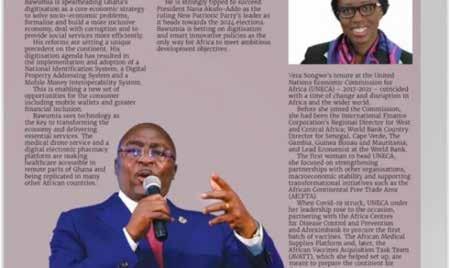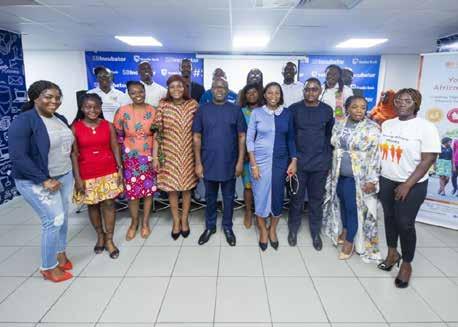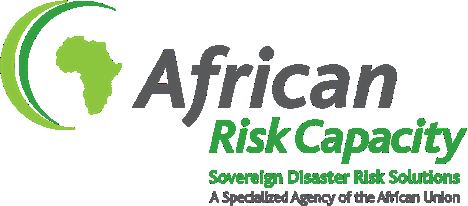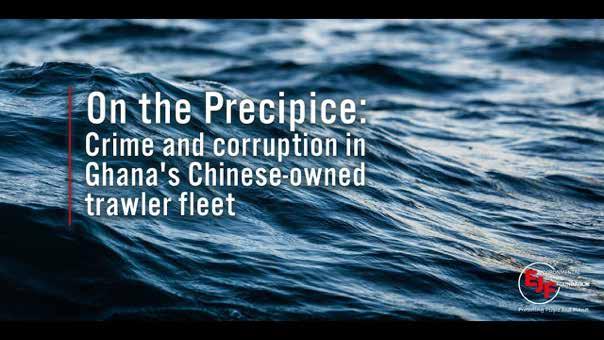












Embattled Finance Minister, Ken Ofori-Atta will still remain in o ce following a vote of censure to have him removed from o ce came unstuck.

This is as a result of a long drawn out debate on the oor of the house by Members of Parliament(MPs) from both sides of the house and eventually culminating into a secret balloting which failed to yield the constitutionally required two thirds margin to ensure the vote becomes substantive, after less than 183 MPs voted to oust him.
At the end of the voting process, 136 Minority MPs voted on the oor of the house on Thursday seeking to remove Mr Ofori-Atta but fell short of the two-thirds constitutional requirement for the motion to pass through.
The Majority MPs before the commencement of the vote staged a walkout and decided not to support the motion of their colleagues from the opposition side of the House.
The Majority Leader, Osei
be part of a process that was baseless and politically motivated.

Mr. Kyei-Mensah-Bonsu addressing the Speaker said the censure motion by the Minority caucus was pushed out of bad faith and only sought to embarrass the Finance Minister.
“You [the Minority] want us to follow you on this misadventure. Mr Speaker, like Pontius Pilate did, we will wash our hands of this”, he said.
The Minority caucus led a motion of censure against the Finance Minister, accusing him of mismanagement of the economy, nancial recklessness, con ict of interest, and gross mismanagement of the economy.
In his defence, the nance minister rejected allegations of con ict of interest and gross mismanagement of the economy levelled against him by the

He said he had done nothing wrong and described the allegations against him as witch-hunting.
“If I say I am innocent they [the minority] will not believe me and if I ask for the truth and proof, they will not be able to provide that. I have committed no crime,” Mr Ofori-Atta insisted on Thursday.
Ofori-Atta has been criticised for his handling of what has become Ghana's worst economic crisis in a generation. This comes at a time when he is leading negotiations with the International Monetary Fund (IMF) for a relief package of up to $3 billion.
The Ghanaian cedi has plummeted more than 40% this year, straining importers of both raw and processed materials. Consumer in ation hit a 21-year high of 40.4% in October on the back of soaring import costs.
The Ghana Revenue Authority (GRA) has arrested supervisors of ve stone and sand quarry companies in the Nsawam Adoagyiri Municipality. Four of the companies, E&H
Quarry Ltd, Atlantic Rock Quarry, China Railways Engineering Quarry Ltd and Quality Quarry Ltd are Chinese entities whiles Paul Addai Stone Quarry, is a Ghanaian-owned company.
In e ect, the GRA has arrested supervisors of these companies for various VAT infractions including selective and non-issuance of VAT receipts among others.
Area Enforcement Manager of Accra Central, GRA, Mr Joseph Annan, who led the exercise, said the visit to the sites are a continuation of what was begun in September this year.

“Compliance really improved when we started in September and that has been evident in our collection. This latest exercise which puts focus on quarries across the country, is an integral part of the national economy. We have moved our focus from commerce to the quarry sector. Our test purchases have indicated that most operators at quarries do not issue the VAT invoice” he said.
Indeed, Mr Annan said on-the-spot assessments alone, done since September this year, has realized more than GH¢800,000, though a lot more
assessments are yet to be done.
“We have collected all these for the state and there is a lot more to collect. Through these enforcements, we have the public also giving us alerts on fake invoices. These are great collaborations that the Authority does not take for granted” he said.
Key items intercepted in the ve companies were idle VAT invoices, waybills, company invoices, computer system units, laptops and company documents.
The retrieved documents from these non-compliant companies, according to Mr Annan, would assist in carrying out full scale investigations to ascertain the amount and extent of revenue loss.
“The CDIs would conduct their investigations as we do our
preemptive assessment and recommend them for full audits. After the investtigations they would face the Authority’s legal unit for possible prosecution” he added.
Last week, ve Chinese rms, Top Stone Quarry, Uniafrika, Derby Quarry, Orient Quarry, Massaike & Sabbagh Company Ltd and Twin Rock Quarry – a Ghanaian company located at the Shai Osudoku District Assembly, were clamped down for various infractions including non-issuance and selective issuance of VAT receipts.
These companies had their o cials arrested and are currently undergoing investigations for possible prosecution.
Since September this year, GRA has invigilated more than 175
taxpayers, all in a bid to meet its GH¢80.3 billion revenue target.

The authority had earlier disclosed that it will enforce compliance in the hospitality sector during the festive season to boost revenue.
Her impact in customer experience is so strongly felt that she was selected to join the Lagos team to develop a blueprint for customer experience, and later appointed as the C1st Ambassador for UBA.
The annual award ceremony organised by Global Ovations under the theme, “Digital Transformation-The new phase of women empowerment’ is aimed at celebrating
outstanding women who have made a mark in their respective elds who are advocating for women.
Belinda who won Corporate Lady of the Year has worked with UBA Ghana for 17 years where she played an instrumental role in her previous positions as a Business Manager for the Madina,

Corporate Business O ce, Tema Main and East Legon 2 Business O ces. Not only that, she was also a pioneer sta at the Takoradi Business O ce where she was the Pro t Centre Manager and achieved remarkable results together with the team.
Belinda is well deserving of this recognition as she is passionate for delivering best customer service.
Commenting on her award, Belinda says, “I am honoured to be recognised by the Women's Choice Award as a winner of the 2022 Corporate Lady of the Year Award. This is a meaningful recognition and I’m humbled. I dedicate this award to my family who are my strong pillar and to all women brightening the corners where they are. I also couldn’t have achieved this on my own without the support of my UBA Family. I feel empowered to do more and to keep being an inspiration to many.”
Belinda’s unchanged belief is in women helping women and she is hoping her win will increase the pro le of women doing great in their elds and empowering others and also inspire young women to aim for greater heights wherever they nd themselves.
She also commends all the nominees in her category for the respective roles they are playing in their elds.
services more e ectively," wrote the magazine.
"His reforms are setting a unique precedent on the continent. His digitisation agenda has resulted in the implementation and adoption of a National Identi cation System, a Digital Property Addressing System and a Mobile Money Interoperability System. This is enabling a new set of opportunities for the consumer including mobile wallets and greater nancial inclusion."
been ranked number one in terms of access to nancial inclusion in Africa, become the rst country in Africa to implement a universal QR Code payment system and Ghana has also become the rst country in the world where banks have issued their own mobile money wallets known as GhanaPay.
Vice President Dr. Mahamudu Bawumia, has been named among the 100 most in uential people in the African continent. The exclusive list of transformational African leaders, was drawn by revered Pan African publication, the New African Magazine, which seeks to recognise, acknowledge and honour a rare breed of transformational African leaders, whose works are truly transforming lives and making telling impacts on their respective countries and the African continent.
Dr. Mahamudu Bawumia was selected in the category of in uential LEADERS, along with Presidents Paul Kagame of Rwanda, Mackey Sall of Senegal and William Ruto of Kenya. Others are African Development Bank (AfDB) President Akinwumi Adesina, Afriexim Bank President Professor Benedict Oramah,

among others.
Dr. Bawumia was recognized for his relentless e orts at spearheading Ghana’s digitization as a core economic strategy to solve socio-economic problems.
Naming Dr. Bawumia as one of Africa's most in uential leaders, the publication eulogised the Vice President for his transformational leadership, noting that his reforms are setting "unique precedents on the African continent."
'The Oxford-trained economist, former Deputy Governor of Ghana's Central Bank and Vice President of the Rephblic of Ghana since 2017, Dr. MahamuduBawumia is spearheading Ghana's digitisation as a core economic strategy to solve socio-economic problems, formalise and build a more inclusive economy, deal with corruption and to provide social
"Bawumia sees technology as the key to transforming the economy and delivering essential services," the publication added.
Dr. Bawumia was also commended by the magazine for initiating Ghana's recent oil for gold barter initiative, which seeks to pay for imported oil with Ghana's gold, rather paying with its reserved US Dollars - a smart move to curb the depreciation of the Cedi, as well as control the rising cost of fuel in the country.
IMPACT OF DR. BAWUMIA’S DIGITISATION INITIATIVES
With the transformational policies Dr. Bawumia has championed, Ghana has achieved the following: successfully issued digital national identity cards to Ghanaian nationals and residents, become the rst African country to adopt a national digital property address system, become the rst African country to implement mobile money interoperability between mobile money accounts and bank accounts,
Through his digitisation initiatives, Ghana has also become the world's largest provider of medical delivery services using Zipline drones to deliver medical supplies to remote parts of the country in real time.
Ghana has also become the rst country in Africa to implement a national scale E-Pharmacy digital platform, and the country has also gitized the provision of government services using a common digital portal (Ghana.gov), as well as a common digital platform for property taxation in Ghana - all contributing immensely to revenue mobilization.
New Africa Magazine's latest honour, adds to the growing list of international acknowledgements of Dr Bawumia, for his starring role in Ghana's acclaimed digitisation drive.
Recently, the UNDP, through its country rep, Angela Rusigi, described Dr. Bawumia as a "champion of digitisation", adding that his e orts have contributed to 'inclusive and accelerated development.

President Nana Addo Dankwa
Akufo-Addo has charged the Lands Commission to expedite action on digitisation process of land acquisition.
Addressing the maiden National Land Conference, organised by the Ministry of Lands and Natural Resources, President Akufo-Addo stated that in this technologically advanced age, it is unacceptable that many sectors of the economy still operate in a largely manual environment.
“We cannot deliver an e cient land administration, if documents on land have to be processed manually. We must, therefore, expedite action on the digitalisation process, and ensure that the Commission goes fully digital. As you go into technical discussions, it is my hope that this will be key on your agenda,’’ he said.
Reiterating the signi cance of land to socio-economic development of the country, the President noted that a rapidly growing population, coupled with competing uses of land, continue to put immense pressure on our land resources.
According to the President, it is for this reason that, “during the rst term of my presidency, we prioritised the passage of the Land Bill,
which had been in the draft stage for some twenty (20) years.”
The Land Act, 2020 (Act 1036), which he assented to on 23rd December 2020, the President explained, “revises, harmonises and consolidates laws on land to ensure sustainable land administration and management, as well as e ective and e cient land tenure systems.”
Successive Governments have sought, through numerous initiatives, to improve Ghana’s land administration regime. The most signi cant intervention has been the Land Administration Project (LAP), Phases 1 and 2, which sought to lay the foundation, and consolidate urban and rural land administration and management systems for e cient and transparent land service delivery. These interventions have yielded some results, such as the reform of the Lands Commission through the enactment of the Lands Commission Act, 2008 (Act 767), the establishment of ve (5) Client Service Access Units (CSAUs) at the Lands Commission to enhance service delivery, the establishment of Customary Land Secretariats, reforms in the Judiciary through
the establishment of specialised land courts and the automation of some courts, the enactment of the Land Use and Spatial Planning Act, 2016 (Act 925), the introduction of a new three-tier Spatial Planning Model, and the development of a National Spatial Development Framework and two (2) Regional Spatial Development Frameworks.
“But laws, in themselves, do not resolve problems. It is their application and e ective implementation that yield the requisite results. That is why this conference, which brings together diverse people from di erent sectors to deliberate on the nexus between land and socio-economic development, is so crucial”, he emphasized.
The President continued, “Fortunately, the Land Act, 2020 (Act 1036), provides a strong foundation for fashioning out a workable and e cient land administration.
The Act has far-reaching provisions which, if implemented, will go a long way to build the e ective land administration we desire’.’
Key amongst them, he said, is the establishment of Customary Land Secretariats to see to the manage-
ment of stool, skin, family and clan lands, restrictions on large scale disposal of family and clans lands without the concurrence of the Regional Lands Commission, the power of the Regional Commission to survey and demarcate land, the provision for electronic conveyancing, the detailed provisions for the compulsory acquisition of land including the payment of compensation, the management and use of public lands, and the provisions for divesting of vested lands.
The Act “also addresses the challenges associated with boundary demarcation, and clari es rights and interests in land, and persons with capacity to alienate land. It provides stringent jail terms for various o ences related to land, such as landguardism, falsi cation of records and fraudulent transactions in land administration”.
President Akufo-Addo expressed his satisfaction with the Ministry of Lands and Natural Resources and the Lands Commission who are leading the sensitisation and education of this important piece of legislation.
This is a continent with vast resource potential in wind, solar, hydro, and geothermal energy, with Central and Southern Africa holding abundant mineral resources, as established in the International Renewable Energy Agency (IRENA) and the African Development Bank (AfDB) January 2022 collaborative report. Per the report, the minerals including manganese, copper, lithium, cobalt, chromium and platinum are essential inputs for renewable energy and low-carbon technologies like electric batteries, wind turbines and other low-carbon technologies, necessary to support Africa’s energy transition agenda.
According to a June 2022 report from the International Energy Agency (IEA), Africa is home to 60 percent of the best solar resources globally, yet only 1 percent of installed solar photovoltaic (PV) capacity— the cheapest source of power in many parts of Africa presently.
Aside being environment and climate-friendly, and often highly cost-e ective compared to the long-run costs fossil fuels, renewable energy (RE) also holds large potential for wider signi cant
socio-economic bene ts for Africa. IRENA’s modelling reveals that when accompanied by an appropriate policy basket, a systematic shift of Africa away from fossil fuels towards an energy system based on renewable energy could lead to 6.4 percent higher gross domestic product (GDP), 3.5 percent more economy-wide jobs, and a 25.4 percent higher welfare index throughout the outlook period of 2020 to 2050.
Yet in spite of the immense benets of renewable energy to the continent, coupled with its resource potential, IRENA & AfDB (2022) suggest that Africa received only 2 percent of global renewable energy investments in the last two decades, with the vast majority of these investments owing to just a handful of countries. In IRENA’s estimation, Africa will requires an annual investment of US$70 billion in renewable energy projects until 2030 to e ectively transition from fossil fuels to clean energy (IRENA 2022a).
However, it must not be lost on us that countries within the African continent are largely
low-income economies whose capacities are not yet up to the task of funding this emerging form of energy on large-scale. The African Development Bank Group therefore sees the private sector as key to mobilizing green energy investment and sustainable development in Africa. In the opinion of the bank, climate change presents a US$3 trillion investment opportunity in Africa by 2030, of which 75 percent of the investment is expected to come from the private sector to complement public sector nancing.
But beyond the concerns around private sectors’ willingness to inject that level of funding, there are few other obstacles to clear, in order to spur growth in renewables to support the continent’s energy transition agenda.
First among the obstacles is the willingness of the private sector in maintaining its preparedness to accelerate climate related investments in particularly an emerging economy like Africa. IRENA (2022b) nds that investors’ willingness to commit capital to
the renewable energy sector is driven by the perceived risk/return pro le of investments, combined with risk mitigation, given that the sector faces multiple barriers such as front-loaded cost structure of renewable energy projects, project proponents’ often limited knowledge and experience, and the lack of reliable investment data in particularly developing countries.
The willingness to inject capital, according to Fruman (2016), would require an enhancement of cooperation between governments and the private sector; to help build trust, close knowledge gaps, spur action, generate a sense of combined ownership of agreed-upon actions, and promote collaboration.
Secondly, it is well documented by many authors such as Medillina et al (2019) that the regional power pools across the African continent are faced with insucient investment in infrastructure and network grids, lack of trust among states and willingness to liberalize markets, dominance by national power providers in national politics, and the
resulting preference for bilateral over regional agreements. Invariably trade between member-states are without trust issues, coupled with the fact that transmission upgrades in Africa are not being developed at a pace that can accommodate greater and more diversied generation capacities, to include more renewables. Meanwhile, African Development Bank study “PIDA Energy Outlook report, 2014”, nds that an interconnected network across the continent would help to save cumulatively by 2040, US$1,117 billion (or US$ 43bn p.a.).
Third, is this argument from industry players and governments in emerging economies such as Africa that a just energy transition requires an inclusive approach that recognizes “no two countries/continents are alike in their capacity (resources, infrastructure etc.)” to transition to lower-carbon economies quickly and fairly. Africa is seeking that space, rst to exploit their fossil resources, earn revenue from exports of same, and ultimately deploy the revenue into infrastructure and services that could raise living standards today. The transitioning to renewables and a lower-carbon future is not the top priority for some. For particularly those presently bene ting from fossil fuel-based energy production, the unwillingness to transition now is founded on the assumption that it would impact negatively on jobs and living standards in fossil fuel sub-sectors, if not considered from a social perspective.
This article carefully examines the prospects of the African Continental Free Trade Agreement (AfCFTA) in Africa’s green energy transition agenda, and explores ways in which regional integration as embodied in the AfCFTA policy could assist in surmounting the prevailing obstacles in scaling up renewable energy deployment in Africa in tandem with the global energy transition.
The African Continental Free Trade Area (AfCFTA) agreement is the most recent and the largest free trade area globally. The agreement provides for the establishment of an AfCFTA Secretariat, with a legal personality distinct from that of the African Union, but governed by the political bodies of the Union (Cofelice, 2018).
The 2020 World Bank report “The African Continental Free Trade Area: Economic and Distributional E ects”, submits that the AfCFTA agreement will connect 1.3 billion people across 55 countries with a combined GDP valued at US$3.4 trillion, with the potential to lift 30 million people out of extreme poverty by 2035. According to the United Nations Economic Commission for Africa, the implementation of the agreement could increase intra-African trade by 52%, com-
pared to 2010 levels, by 2022, thus reducing the gap with intra-regional trade quotas currently characterizing Asia (51%), North America (54%) and Europe (67%).
The World Bank’s analysis shows that full implementation of AfCFTA agreement could boost income by 7 percent, or nearly US$450 billion by 2035, in 2014 prices and market exchange rates.
The agreement would also signicantly expand African trade, particularly intra-regional trade in manufacturing; increasing employment opportunities and wages for unskilled workers and helping close the wage gap between men and women. Regional output and productivity according to the analysis, would also be boosted, leading to re-allocation of resources across sectors and countries. And that by 2035, total production of the continent would be almost US$212 billion higher than the baseline. Output is expected to increase the most in natural resources and services (1.7%), with manufacturing seeing a 1.2 percent rise, the report indicates.
According to the World Bank report, AfCFTA would reduce tari s among member countries and cover policy areas, such as trade facilitation and services, as well as regulatory measures, such as sanitary standards and technical barriers to trade. It will complement existing sub-regional economic communities and trade agreements by o ering a continent-wide regulatory framework and by regulating policy areas, such as investment and intellectual property rights protection that have not been covered in most sub-regional agreements.
Cofelice (2018) argues that the consolidation of African regionalism can therefore prove decisive, on the one hand, to develop an adequate negotiating power vis-à-vis relevant commercial partners (such as the European Union and China); on the other, to promote economies of scale and value chains that can boost African companies to compete on international markets. This means that the establishment of the AfCFTA would enable Africa to strengthen its position vis-à-vis the rest of the world, speak with one voice and act in unanimity on all continental and international trade issues.
So in e ect, AfCFTA promises growth and shared prosperity in Africa through broader and deeper economic integration, investment attraction and trade boosting.
However, the AfCFTA agreement cannot be implemented successfully without massive investment in energy, roads, ports, electricity
and other key infrastructural area. The need for energy supply reliability becomes more critical on the back of International Energy Agency’s (IEA’s) Africa Energy Outlook 2019 special report noting that over 600 million people in Africa had no access to electricity and a further 900 million people were without access to clean cooking energy (IEA, 2019).
Roles AfCFTA can play in Africa’s Transition Agenda Individually, African countries face challenges in areas such as infrastructure, policy, regulation, nance, human capital, technology, and o -take certainty; which must all be addressed to fully implement a green energy transition. Adeniran and Onyekwena (2020), and ESI Africa (2021) argues that through the consolidation of small, poor, and fragmented African countries into one strong market, backed by strong collaborations, the dynamics can be altered in terms of access to funding, infrastructure modernization, strong regulations and policies, human capital, and technology et cetera, for the renewable energy sector.
The AfCFTA secretariat can therefore work with member countries to accelerate Africa’s energy transition by for instance; helping with shaping joint policy and regulatory frameworks, strengthening dialogue between investors and governments, and promoting a single power market and infrastructure development growth. Additionally, the AfCFTA platform can provide support for a ‘just and inclusive’ energy transition, assisting with reducing nancing and o -take uncertainties, and facilitating the establishment of additional Pan-African Green Banks, among others.
Increased dialogues between industry and government is necessary for formulation of e ective policies, for fostering public-private partnerships for dissemination of innovative technologies, and for the successful implementation of Africa’s renewable energy targets and broader climate objectives. Dialogues becomes more crucial in terms of strengthening local supply chains that support a dynamic renewable energy market.
The AfCFTA secretariat can assist with enhancement of industry versus government dialogues, investment forums and other platforms for knowledge sharing, capacity development, and exploration of open-source agreements for projects in an emerging market like Africa; to ensure legal risks
and barriers are mitigated. Increased transparency and strengthened dialogues championed by the AfCFTA on best alternatives to de-risk investments would allow the renewable energy sector to plan better for and respond faster to policy demands and the needs of respective African countries. AfCFTA’s intervention in ensuring that inter-governmental institutions work collaboratively with industry in pursuit of shared sustainable development goals is more important than ever, because through the collaboration; regulatory, legal and administrative barriers to investment in renewable energy can be minimized.
2. Push for Joint Policy and
It is widely acknowledged that developing countries face several obstacles from the policy and regulatory point. To make the Africa market accessible to the investor community, policy clarity, enhanced regulation, and a transparent implementation strategies that establishes Africa’s energy transition roadmap is indeed paramount. Also a comprehensive review of existing regulatory frameworks for each member country with the intention of harmonizing same is paramount to advance the transition agenda. Fortunately under the AfCFTA, member countries are obligated to align local laws with broad regional plans. In this instance, the AfCFTA secretariat can prioritized support for a joint policy and regulatory framework. The support could be in the form of ensuring policy coherence, long-term policy certainty and stability for existing and planned projects in the renewable energy sector. The joint policy and regulatory framework must be one that for instance, outlines speci c transmission grid infrastructure plan for future renewable energy developments, the interconnection of regional transmission lines, and the plan to have a higher shares of variable renewable energy. Also, the AfCFTA secretariat can assist with ensuring that member countries have high level commitment to legal framework, a re-consideration of retrospective policy changes, and respect for approved contracts and agreements in accordance with the rule of law. This is necessary to establish investor con dence in respective African countries as it minimizes o -take risk.
3.
The AfCFTA has the potential to promote the harmonization of Africa’s national and regional electricity markets, to form a single market, and to promote the e cient development of electricity
infrastructure and symbiotic electricity trading between members of its existing ve regional electric power pools. Expanding and modernizing Africa’s transmission infrastructures, and increasing the grid capacities, particularly in countries best endowed with renewable resources, can further unlock the continent’s abundant renewable energy potential.
On that score, the AfCFTA secretariat can push for changes in respective national policies to adhere to the requirement of Africa’s single electricity market, centered on the organization of the sector and its regulation. It can promote and push for fair market access and a high level of consumer protection, removal of obstacles and trade barriers, a clear mechanism to secure and enforce trading contracts, exibility in the power system, as well as high levels of interconnection and generation capacity among member states. Besides, it can assist with the coordination of technical and commercial endeavors of the regional power pools to include; sharing mechanisms of best practices, harmonization of regulations and grid codes, and the promotion electricity trading opportunities that will catalyze the development of inter-regional infrastructure projects.
4. Support a Just and Inclusive Energy Transition
There is a growing recognition of the importance of focusing on ‘just and inclusive energy transition’ as countries across the globe seek to accelerate their energy transition drives, to address more strongly the equity and justice elements of the transition so the agenda avoids the danger of becoming another abstract idea.
The AfCFTA secretariat can take up the role of facilitating inclusive and participatory decision-making with respect to the energy transition through Multi-Actor Partnerships (MAPs) that re ect all relevant stakeholders (such as government, fossil fuel companies, labour organizations, workers, communities, and citizens) a ected by the transition. Getting these stakeholders to become participative actors
would help identify priority areas, establish concrete actions, and foster international collaboration to understand how to promote and support ‘just and inclusive energy transitions’.
Also, the secretariat can provide assistance for political decision-makers in Africa to put in place the necessary policies, regulations, incentives, as well as securities to guarantee continuity and sustainability for socio-economic development. And most importantly, the AfCFTA secretariat can promote the establishment of “Africa’s Just Transition Fund” with member countries binding nancial support measures, and dedicated to the just transition of countries heavily reliant on fossil economies.
5. Assist with reducing Financing and O -take Uncertainties

Investors are cautious in committing capital to renewables and quite unsettled on certainty of power o -takes, due to the perceived risk/return pro le of investments, coupled with risk mitigation. This is so because the sector faces multiple barriers such as front-loaded cost structure of renewable energy projects, project proponents’ often limited knowledge and experience, and the lack of reliable investment data in particularly developing countries.
The AfCFTA secretariat can help bridge the energy transition funding gap via the provision of advisory to member countries on nancing, and support the application of related mechanisms. This may involve providing understanding on investment risks and barriers, and facilitating investments through appropriate tools and instruments, providing comprehensive renewable energy investment data, and assisting member states in building renewable energy project pipelines. The secretariat must be in goal position to clear for investors the creditworthiness of state-owned power companies in Africa.
The AfCFTA secretariat can also partner with institutions like the West African Science Service Centre on Climate Change and Adapted Land Use (WASCAL),
and the Southern African Science Service Centre on Climate Change and Adapted Land Use (SASCAL) to engage in case studies and research activities to develop practical proposals that could address some of the key nancing and o -take uncertainties that have hampered the uptake of renewable energy investments in Africa.
6. Assist with establishment of additional pan-African Green Banks
There is a need for Africa to have more of home-grown nancing markets, capable of sustainably holding and supporting long-term investments in green energy and resource e ciency through a combination of commercial and concessional nancing.
The AfCFTA secretariat can facilitate the establishment of let’s say pan-African Green Banks, to augment the works of the likes of African Green Infrastructure Investment Bank (AfGIIB) initiative. The mandate would be to provide sustainable support to renewable energy projects across the continent, just like the African Development Bank (AfDB) whose objective is to support economic development and social progress in Africa by promoting public and private capital projects that aim to reduce poverty and improve living conditions. The Green banks could also help divert private investments into sustainable green projects by o ering credit lines and technical assistance to local companies, partners, inventors and individuals; who seek nancial support for green projects. The pan-African banks must de nitely go beyond providing simple lines of nance, to include advisory services to help clients enhance their market practices.
Adeniran and Onyekwena (2020). Accelerating Green Energy Transition in Africa through Regional Integration. South African Institute of International A airs (SAIIA), Policy Brie ng 216. Published as part of the project EU-Africa Partnership for Energy Access and a Green Transition.
Cofelice A. (2018). African Continental Free Trade Area: Opportunities and Challenges. Comments on “The Federalist Debate Year XXXI”, N° 3, November
2018. DOI: 10.2478/tfd-2018-0032.
ESI Africa (2021). AfCFTA strengthens the continent’s energy transition. An article by ESI Africa published on Jul 1, 2021. Accessed from https://www.esi-africa.com/industry-sectors/business-and-markets/afcfta-strengthens-the-continents-ene rgy-transition on 27th July 2022.
Fruman C. (2016). Why dialogue between government and the private sector is essential to ght climate change. Article published on May 17, 2016 and accessed from https://blogs.worldbank.org/psd/why-dialogue-between-government-and-private-sector-essential- ght-cli mate-change.
IEA (2019). International Energy Agency (IEA), Africa Energy Outlook 2019, World Energy Outlook special report (Paris: IEA, 2019).
IEA (2022a). Renewable Energy Market Update: Outlook for 2022 and 2023. A Publication by the International Energy Agency, May 2022.
IEA (2022b) Global energy crisis shows urgency of accelerating investment in cheaper and cleaner energy in Africa. A June 2022 IEA report accessed from https://www.iea.org/news/global-energy-crisis-shows-urgency-of-accelerating-investment-in-cheaper-a nd-cleaner-energy-in-africa on 15 October 2022.
IRENA (2022a). The Investment Case for Energy Transition in Africa. An article published by the International Renewable Energy Agency on 31 March 2022 sourced from https://www.irena.org/newsroom/articles/2020/Mar/The-Investment-Case-for-Energy-Transition-in-Africa IRENA (2022b). Renewable Energy Finance. Accesses from https://www.irena.org/institutionalstructure/Renewable-Energy-Finance.
IRENA and AfDB (2022). Renewable Energy Market Analysis: Africa and Its Regions. International Renewable Energy Agency and African Development Bank 2022 publication, Abu Dhabi and Abidjan. Accessed from https://www.irena.org/publications/2022/Jan/Renewable-Energy-Market-Analysis-Africa on 21 September 2022.
Medinilla A., Byiers B, and Karaki K. (2019). African power pools: Regional energy, national power. ECDPM discussion paper 244, February 2019. Accessed from https://ecdpm.org/publications/african-power-pools-regional-energy-national-power on 15th August 2022.
World Bank (2018). Access to energy is at the heart of development. Article published on April 18, 2018.
World Bank (2020). The African Continental Free Trade Area: Economic and Distributional E ects. Washington, DC: World Bank. © World Bank. https://openknowledge.worldbank.org/handle/10986/34139 License: CC BY 3.0 IGO.
AUTHORS: Institute for Energy Security (IES)
Edmond KOMBAT, Director of Research & Finance @ edmond@iesgh.org
Nana AMOASI VII, Executive Director @ paakwasi@iesgh.org
Adle IBRAHIM, Research & Policy Analyst @ adle@iesgh.org



Teachers’ Appreciation Day in a spectacular event on Friday, December 2nd which will register as one of the best in the history books of the school.
The momentous event began with a Thanksgiving Service at the Aggrey Chapel, followed by a dinner and awards ceremony which brought together Akoras, the past headmistress Mrs Charlotte Brew-Graves, teachers, and house masters/mistresses, as well as current teachers of the school. The Assembly Hall, which was the venue for the dinner and awards ceremony, was decorated and transformed into a beautiful space. Teachers were treated to a special ambience, spoken word performances, and a feast featuring an assortment of continental dishes. An electrifying music performance from the legendary Okyeame Kwame charged the atmosphere with his hits and the
The highlight of the day was the presentation of awards and tokens by the old students to show their love and appreciation to their teachers. The current teachers weren’t left out, receiving souvenirs and ra e tickets where winners received cool prizes such as a night stay at the plush Marriott Hotel in Accra. Committee Chair for the Teachers’ Appreciation Day, Dzifa Amoah, said after the event, “It has been one year of planning this special day. Today, we are ful lled that all our e orts have really paid o . Our topmost desire was to make our teachers happy and the smiles and feedback we have received so far testify that our mission has been achieved.”
“Twenty years after leaving this school, we wouldn’t be where we are without those noble teachers who taught us, motivat-
lives. I cannot also forget all the 2002-year group members who supported in diverse ways, especially through their contributions to make the day a great success.”
The celebrated teachers were grateful and showered praises on the Class of 2002. In an emotional speech, former housemaster of Lugard House, Mr Ohene Kena, spoke on behalf of the teachers, saying, “We will remember this day forever. We are blown away with what you have done and shown us today. We really are appreciative of all the e orts you have put into this for us.”
Raymond Yirenkyi-Addo, currently a Chemistry teacher on sta , remarked, “My sincere thanks go to the Organizing Committee and the entire year group for this wonderful Teachers’ Appreciation Day event. Congrat-
your co ers. I really appreciated
The 2002-year group showed up at the event in customised T-shirts with an opportunity to relive the Motown experience as the MC took them down memory lane with snippets of interesting happenings back in school. Music of their era also added to the nostalgia and memories of records nights.
Every year, the year group marking its 20th anniversary of leaving the school is given the baton to host the Teachers’ Appreciation Day event to appreciate the kind and hard-working individuals who created an everlasting impact on their lives while in Achimota School.
Following the successful event, members of the year group have taken to their o cial WhatsApp page to commend the organising team for putting up an excellent event that will forever be remembered in the history books of
President Nana Addo Dankwa Akufo-Addo, on Thursday, 8th December 2022, commissioned a new state-of-the-art Dry Bulk Terminal and the Atlantic Terminal Services Multipurpose Container Terminal, as well as the Prime Meridian Dock Company’s Floating Dry-dock at the Takoradi Harbour in the Western region.
The President also cut the sod for work to commence on the construction of a US$98 million modern oil and gas services terminal, “as part of the strategic development of the Port of Takoradi, to service the emerging Petroleum Hub and accommodate oil and gas service providers, fabrication companies, exploration companies and their suppliers for supply base activities.”

The Floating Dry-Dock and Ship Maintenance facility, which is being introduced in partnership with a wholly-owned Ghanaian company, Prime Meridian Dock Limited (PMD), according to him,
meant to carry out maintenance works on vessels which, otherwise, would have had to call at Las Palmas, Carina, and other ship repair facilities in other countries for maintenance works.”
These projects, the President pointed out, “will enhance cargo handling capacity, maintenance and repairs of ships, and also meet the demands of the rigours of the oil and gas service sector within the Takoradi Port enclave.”
Completed at a total cost of US$85.0 million, the Dry Bulk Terminal, the President said, “has been equipped with modern ship loaders and eco-hoppers for the safety of both workers and members of the Port community.”
The new ATS Container Terminal facility, which is part of the multi-Purpose Terminal, he continued, “will take care of both export and import containers
2023.
To this end, the President noted that Concessionaire, another wholly owned Ghanaian entity, which has already spent US$147 million on constructing the facility, will spend the next three (3) months equipping the facility for it to become operational. Reiterating the importance of private sector to national Development President Akufo-Addo stated commended the Ghana Ports and Harbours Authority for its partnership with the private sector for the rolling out of these projects.
“The Ghanaian people and I are hopeful that the Oil Service Terminal and the Floating Dry-Dock Projects, for which I am cutting the sod, will be completed on schedule to avoid cost overruns”, he added Value-Addition Activities President Akufo-Addo told the gathering that his government has never been a believer of the
di seen as an export-oriented Port.
“To demonstrate this perspective, Government has worked hard to modernise the Takoradi Port, and diversify its reliance on export of raw materials like manganese and bauxite, which has never yielded high value returns to the country”, he said.
He continued, “as part of strategies to promote value-added products and sustainable mining, Government has put a 5-million-ton limit on the quantity of manganese to be mined for export. We also intend placing an annual volume limit on the export of raw bauxite, as part of the Integrated Aluminum Development Project.
Indeed, the Dry Bulk Terminal, commissioned by the President, has been equipped with an e cient cargo handling system to facilitate accurate measurement of the various export volumes for manganese and bauxite to check
There are plans by the Akufo-Ad do administration to establish an Agricultural Development Zone in the Northern Region.

The agricultural development zone, which will cover between 20-40 hectares of farm land, will be developed for prospective agriculture investors.
The Minister of Food and Agriculture (MoFA), Dr. Owusu Afriyie Akoto, made the disclosure when he paid a courtesy call on the Overlord of the Kingdom of Dagbon, Ya-Na Abukari II, at his Gbewaa Palace, Yendi in the Northern Region on Wednesday, December 7, 2022.
The visit by the minister formed part of his ongoing working tour in the northern part of the country.
“I have with me a proposal to the Ya-Na. We are proposing to set up an Agricultural Development Zone in the Kingdom of Dagbon. This zone will consist of 20-40 hectares of farm land,” he disclosed.
According to him, his ministry already has some international companies who are willing to invest in agriculture in Ghana, assuring that “I will bring them to the Kingdom of Dagbon.”
The minister con dently expressed that within a space of three (3) to four (4) years, the
economic landscape of the Northern region will be transformed after the establishment of this “special agricultural development zone.”
This facility, he said, will provide jobs to the teeming youth in the region, adding that “we will furnish it well with accurate machinery to help brand our farm produce well for domestic and foreign exports.
He added that the zone will not only cultivate crops but more importantly, add value to the produce.
Dr. Afriyie Akoto, however, used the visit to appeal to Ya-Na Abukari II to use his authority to help the government enforce the ban on export of foodstu s to Ghana’s neighbouring countries.
He said it was sad that his ministry continued to receive reports of foodstu being smuggled to Ghana’s neighbouring countries,
“I plead with you to use your power and authority to act as a check on the illegal export of food to our neighbouring countries. This issue has been discussed with the regional minister already, but I am pleading with you together with your various traditional rulers to help the government deal with it,” he
appealed.
He stressed that the essence of the Planting for Food and Jobs (PFJ) policy is to inure to the bene t farmers and by extension Ghanaians, hence “if there is an outcome of the initiative, it should bene t us in the country and not outsiders.”
In a show of appreciation, the Overlord of the Kingdom of Dagbon, Ya-Na Abukari II, warmly welcomed the minister and commended him for his hard work in the agriculture sector.
“Your visit today shows your continuous recognition and readiness to collaborate with the traditional authorities as custodians of the land and major stakeholders in agriculture and its related elds.”
“I further wish to thank the President of the Republic for the con dence he has reposed in you to continuously steer a airs of the agriculture ministry,” Ya-Na Abukari II gladly expressed.
He encouraged the minister to continue the path of forging good working relationships with the traditional authorities.
“I wish, once again, to give you the assurance and readiness of the Dagbon Chiefs to collaborate
with you to ensure that you leave an excellent footprint in the ministry,” the Overlord of Dagbon rmly assured.
He seized the opportunity to congratulate the 2022 National Best Farmer, Nana Yaw Sarpong Serebour, who is a traditional ruler.
“His award serves as an inspiration to the chiefs and increasing unemployed youth in the country,” he stated.
On that score, Ya-Na Abukari II called on the youth and chiefs in the Dagbon Kingdom to direct more attention to agriculture to help deal with food shortages and increasing unemployment in the country.
He bemoaned the fact that northern Ghana was still lagging behind in development.
“I must say it is unfortunate that our vast arable lands are left without any attention, and despite the enormous interventions by governments, Dagbon is still struggling with high levels of youth unemployment,” he lamented.
This, he stressed, required an immediate action, calling on the minster to direct more attention to the Kingdom of Dagbon to help create opportunities for the many unemployed youth.
Central banks’ unwavering deter mination to increase interest rates is truly remarkable. In the name of taming in ation, they have deliberately set themselves on a path to cause a recession – or to worsen it if it comes anyway. Moreover, they openly acknowledge the pain their policies will cause, even if they don’t emphasize that it is the poor and marginalized, not their friends on Wall Street, who will bear the brunt of it. And in the United States, this pain will disproportionately befall people of color.
As a new Roosevelt Institute report that I co-authored shows, any bene ts from the extra interest-rate-driven reduction in in ation will be minimal, compared to what would have happened anyway. In ation already appears to be easing. It may be moderating more slowly than optimists hoped a year ago – before Russia’s war in Ukraine – but it is moderating nonetheless, and for the same reasons that optimists had outlined. For example, high auto prices, caused by a shortage of computer chips, would come down as the bottlenecks were resolved. That has been happening, and car inventories have indeed been rising.
Optimists also expected oil prices to decrease, rather than continuing to increase; that, too, is precisely what has happened. In fact, the declining cost of renewables implies that the long-run price of oil will fall even lower than today’s price. It is a shame that we didn’t move to renewables earlier. We would have been much better insulated from the vagaries of fossil-fuel prices, and far less vulnerable to the whims of petrostate dictators like

war-mongering, journalist-murdering leader, Crown Prince Mohammed bin Salman (widely known as MBS). We should be thankful that both men failed in their apparent attempt to in uence the US 2022 midterm election by sharply cutting oil production in early October. Yet another reason for optimism has to do with mark-ups – the amount by which prices exceed costs. While mark-ups have risen slowly with the increased monopolization of the US economy, they have soared since the onset of the COVID-19 crisis. As the economy emerges more fully from the pandemic (and, one hopes, from the war) they should decrease, thereby moderating in ation. Yes, wages have been temporarily rising faster than in the pre-pandemic period, but that is a good thing. There has been a huge secular increase in inequality, which the recent decrease in workers’ real (in ation-adjusted) wages has only made worse.
The Roosevelt report also dispenses with the argument that today’s in ation is due to excessive pandemic spending, and that bringing it back down requires a long period of high unemployment. Demand-driven in ation occurs when aggregate demand exceeds potential aggregate supply. But that, for the most part, has not been happening. Instead, the pandemic gave rise to numerous sectoral supply constraints and demand shifts that – together with adjustment asymmetries – became the primary drivers of price growth. Consider, for example, that there
the pandemic. Not only did Trump-era COVID-19 policies contribute to the loss of more than a million people in the US (and that is just the o cial gure), but immigration also declined, owing to new restrictions and a generally less welcoming, more xenophobic environment. The driver of the increase in rents was thus not a large increase in the need for housing, but rather the widespread shift to remote work, which changed where people (particularly knowledge workers) wanted to live. As many professionals moved, rents and housing costs increased in some areas and fell in others. But rents where demand increased rose more than those where demand fell decreased; thus, the demand shift contributed to overall in ation. Let us return to the big policy question at hand. Will higher interest rates increase the supply of chips for cars, or the supply of oil (somehow persuading MBS to supply more)? Will they lower the price of food, other than by reducing global incomes so much that people pare their diets? Of course not. On the contrary, higher interest rates make it even more di cult to mobilize investments that could alleviate supply shortages. And as both the Roosevelt report and my earlier Brookings Institution report with Anton Korinek show, there are many other ways that higher interest rates may exacerbate in ationary pressures.
Well-directed scal policies and other, more nely tuned measures have a better chance of taming today’s in ation than do
tive monetary policies. The appropriate response to high food prices, for example, is to reverse a decades-old agricultural price-support policy that pays farmers not to produce, when they should be encouraged to produce more.
Likewise, the appropriate response to increased prices resulting from undue market power is better antitrust enforcement, and the way to respond to poor households’ higher rents is to encourage investment in new housing, whereas higher interest rates do the opposite. If there was a labor shortage (the standard sign of which is increased real wages – the opposite of what we are currently seeing), the response should involve increased provision of childcare, pro-immigration policies, and measures to boost wages and improve working conditions.
After more than a decade of ultra-low interest rates, it makes sense to “normalize” them. But raising interest rates beyond that, in a quixotic attempt to tame in ation rapidly, will not only be painful now; it will leave long-lasting scars, especially on those who are least able to bear the brunt of these ill-conceived policies. By contrast, most of the scal and other responses described here would yield long-term social bene ts, even if in ation turned out to be more muted than anticipated.
The psychologist Abraham Maslow famously said, “To a man with a hammer, everything looks like a nail.” Just because the US Federal Reserve has a hammer, it shouldn’t go around smashing the economy.
The world is confronting multiple, compounding crises, from COVID-19, energy, in ation, debt, and climate shocks to una ordable living costs and political instability. The need for ambitious action cannot be greater. However, the return of failed policies such as austerity, now called “ scal restraint” or “ scal consolidation,” and a lack of e ective taxation and debt-reduction initiatives threaten to exacerbate the macroeconomic instability and daily hardships that billions of people are facing. Unless policymakers change course, an “austerity pandemic” will make global economic recovery even more di cult.
As we show in a recent report, the looming wave of austerity will be even more premature and severe than the one that followed the 2008 global nancial crisis. An analysis of IMF expenditure projections indicates that 143 governments will cut spending (as a share of GDP) in 2023, a ecting more than 6.7 billion people –or 85% of the world population. In fact, most governments started scaling back public spending in 2021, and the number of countries slashing budgets is expected to rise through 2025. With average spending cuts of 3.5% of GDP in 2021, this contraction has already been much bigger than in earlier shocks.

Even more worryingly, upwards of 50 countries are adopting excessive cuts, meaning their spending has fallen below their (already low) pre-pandemic
levels. This cohort contains many countries – including Equatorial Guinea, Eswatini, Guyana, Libe ria, Libya, Sudan, Suriname, and Yemen – with large unmet devel opment needs.
The austerity measures that governments are considering or already implementing will be deeply harmful to their populations, and especially to women.
Governments are planning to limit social protections for vulnerable populations; cut programs for families, the elderly, and people with disabilities; slash or cap the public-sector wage bill (implying a reduction of frontline workers like teachers and health personnel); eliminate subsidies; privatize transportation, energy, and water services; cut pension bene ts; reduce labor protections and employers’ social-security contributions; and decrease health expenditures.
In parallel, many governments are adopting short-term revenue-generation strategies that will also have detrimental social e ects. These include increasing consumption taxes – such as regressive sales and value-added taxes (VAT) – strengthening public-private partnerships, and increasing fees for public services.

Just in eastern and southern Africa, UNICEF nds that Eswatini (formerly Swaziland), Kenya, Madagascar, Rwanda, and South Africa are considering or implementing three categories of austerity measures, while Lesotho is pursuing four categories,
increases, Botswana, Kenya, Madagascar, Rwanda, and Zambia are each considering at least seven categories of austerity measures that are known to have adverse social impacts. Not only are these governments pursuing painful austerity at a time when the region is dealing with unprecedented droughts and a cost-of-living crisis. They also are showing little willingness to adopt policies – such as higher tax rates for corporations and wealthy individuals – that are critical to reducing their already-high levels of inequality. Unless austerity is reversed, people in developing countries will lose social protections and public services just when they are most needed. According to Oxfam, almost half of the global population is already living on less than $5.50 per day. And, lest we forget, trillions of dollars have been mobilized since the start of the pandemic to support corporations, while ordinary people have borne many of the costs of adjustment.
The dangers of an aggressive austerity approach were made clear over the past decade. From 2010 to 2019, billions of lives were upended by cuts to pensions and social bene ts; lower investments in programs for women, children, and the elderly; fewer and
there are at least nine other nancing options that some governments have been using for years, and that are fully endorsed by the United Nations and international nancial institutions. These include progressive taxation; debt elimination or restructuring; clamping down on illicit nancial ows; increasing employers’ social-security contributions and coverage by formalizing workers in the informal economy; using scal and foreign-exchange reserves; re-allocating public expenditures; adopting a more accommodating macroeconomic framework; securing o cial development assistance; and new allocations of the IMF’s reserve asset, special drawing rights.
Since scal decisions a ect everyone, they should be made not behind closed doors, but through inclusive and transparent national dialogues that include trade unions, employer federations, and civil-society organizations. Governments must abandon austerity measures that bene t the few at the expense of the many. Only by exploring alternative approaches can we support people and get back on track to achieve the UN Sustainable Development Goals. The world is still su ering one kind of pandemic. There is no need for another.
tion had risen to over 40 per cent, while the cedi had depreciated by over 53 per cent on a year-to-date basis.
He, however, assured the ambassador that the raft of measures introduced by the central bank and the impending International Monetary Fund (IMF) programme would help to restore macroeconomic stability in the medium term.
The Governor expressed optimism that the 2023 Budget had taken the initial step to reset scal policy on a consolidation path, and its smooth implementation would ease debt sustainability concerns.
ment for the key role they have played in ensuring that the banking sector remained sound and safe, in spite of the economic challenges.
She also pledged her o ce’s support to Ghana as steps were being taken to overcome the current economic challenges, emphasising that there was the need to use the opportunity to push through major economic reforms to permanently resolve the current economic challenges.
The Ambassador was accompanied by the Economic Section Chief of the US Embassy, Stephanie Hutchison.
The United States (US) Ambassador to Ghana, Virginia Palmer, has paid a courtesy call on the Governor of the Bank of Ghana, Dr Ernest Addison, and the man
agement of the central bank.
In a welcoming address, Dr Addison provided an overview of Ghana’s current economic situation and noted that in a-
For her part, the US Ambassador to Ghana expressed her gratitude to the Governor and the management of the bank. She commended the Dr Addison-led manage-
In the Governor’s team were the First Deputy Governor, Dr Maxwell Opoku-Afari, and the Second Deputy Governor, Elsie Addo Awadzi, as well as other directors of the central bank.

Vodafone Ghana’s commitment to introducing innovative and creative ways to ensure that we adhere to best practices.” It validates our commitment to providing our customers with an unparalleled experience. “We will continue to invest in our network and people to provide quality services to our customers,” she said.
These new awards, along with Vodafone’s extensive list of past honours, solidify the technology company’s leadership in product innovation, creative and engaging advertising, and sustainable community campaigns that promote development.
Vodafone Ghana received ve prestigious awards at the 4th National Communications Awards, which was held this past weekend at the Labadi Beach Hotel in Accra.

The Vodafone Ghana Fixed Broadband team received the Access Innovation Award for Broadband Connectivity, while the Vodafone Ghana Foundation
received the Social Contribution Award. Furthermore, the organisers named Vodafone Cash one of Africa’s Top 20 Technology and Telecom Products. Two of the telco’s executives were also honoured: Patricia Obo-Nai, CEO of Vodafone Ghana, was named Transformational Technology Leader of the Year, and Hannah Ashiokai Akrong, HR Director of
Vodafone Ghana, was named Telecom HR Personality of the Year.
In her remarks about the awards, Hannah Ashiokai Akrong, Human Resources Director at Vodafone Ghana, expressed her heartfelt gratitude to the event’s organisers, Vodafone employees, and customers.
“These awards demonstrate
The National Communications Awards are a prestigious, high-impact development communications program created and produced by RAD Communications Limited to promote e ective communication as a means of national development. The awards are given to individuals and organisations that have demonstrated excellence while tackling new challenges in Ghana’s media, information, and communications sectors.
ing Group, which made a favourable recommendation for Senegal's participation in the ARC's sovereign parametric insurance product covering the costs of interventions in the event of epidemics of Ebola virus disease, Marburg virus disease, and Meningitis.
The Pan-African Risk Management Capacity (ARC) today announced the o cial launch of the parametric insurance product against high-impact epidemic risks and Senegal's participation as the rst African country to join this innovative new nancing mechanism.

African Finance Ministers in 2015 requested ARC to develop a product to meet countries' rapid funding needs to contain high-impact infectious disease outbreaks and complement the e orts of the African Centre for Prevention and
of disease control (Africa CDC).
In 2022, the ARC Group and its partners nalized the development of the said product, which will provide parametric insurance to African Union (AU) member states for three selected pathogens responsible for Ebola virus disease, Marburg virus disease, and Meningitis.
At a workshop held on September 28, 2022, in Dakar, the ARC's parametric insurance product against high-impact diseases with epidemic potential was presented to the ARC's Technical Work-
Thus, Senegal will become the rst African country to bene t from this innovative nancing instrument against epidemic outbreaks and thus paves the way for other member states of the African Union (AU).
“In our perspective of diversifying our product o ering aimed at protecting the most vulnerable populations of our continent, we are today launching this new sovereign risk transfer mechanism through parametric insurance, which will allow our Member States to bene t, in addition to insurance against
climate-related disasters, coverage against epidemic risks,” said UN Under-Secretary-General and ARC Group Director General Ibrahima Cheikh Diong. "We are con dent that these predictable funding tools coupled with operational plans will strengthen the response capacity of our Member States while developing their expertise in the face of public health emergencies".
The epidemic risk was estimated by Ginkgo Bio works; subscription to the insurance product was made through ARC Ltd, a nancial subsidiary of ARC; Munich Re has been chosen as the lead reinsurer for the insurance product due to its long-standing expertise in epidemic risks and parametric insurance solutions; the reinsurance broking service was performed by AON, and the insurance premium was subsidized by the Swiss Agency for Development and Cooperation (SDC).
The evangelism programme, which began from the group's premises through to the School Junction end of the main Ashley Botwe-Nmai-Dzorn in Accra, saw the participants interact with people on the streets, homes and in vehicles about the saving grace of Christ.
Many who received the good news were excited about the fact that Christ is the centre of the JGC and ZGL.
Just as cleanliness is next to Godliness, she admonished Ghanaians to ensure that their environment was treated with respect.
For her part, the Communications and Corporate A airs Director of ZGL, Mrs. Emma Adwoa Appiaa Osei-Duah, entreated the citizenry to take advantage of the free bins initiative currently ongoing, stressing however, that they may doon be required to pay fot it.
As part of e orts to give hope to Ghanaians in these trying times, the Jospong Group of Companies (JGC) and Zoomlion Ghana Limited (ZGL) used its Annual Thanksgiving Service (2022), to reach out to lost souls and win them for Christ.
As a directive from the Executive Chairman of JGC, Dr. Joseph Siaw Agyepong, sta members of JGC and ZGL on Thursday, December 8,2022, marched onto the streets to speak to people about the unfailing love of Jesus Christ.

Speaking in an interview with the media on the essence of the programme, the Chief Corporate Communications O cer of JGC, Mrs. Sophia Kudjordji, said the outreach was meant to remind Ghanaians that all hope was not lost.
She said the only way to be joyful in life was to surrender one's life to Christ and as well experience peace.
She again urged the public to eschew the practice of dropping trashes around and rather adopt putting them into dustbins.
Earlier, the Mission Director of the Church of Pentecost, Apostle Emmanuel Agyeman Bekoe, stated that the Lord deserves to be celebrated for what He has done and who He is.
He explained that celebrating
God for His greatness was very vital, especially in the light of His mighty works.
Sharing the word of God with a gathering of sta members, heads of departments of JGC and ZGL Apostle Agyeman Bekoe underscored the importance of celebrating the Lord always.
According to him, God ought to be worshipped for all His deeds
He further explained that o ering thanksgiving to God means sounding trumpets and other musical instruments.
While in the Old Testament, thanking the Lord means singing and marching to the glory of the Lord, praying and singing are characteristics of the New Testament era, he averred.
Tracts and placards bearing inscriptions such as "Are you ready for His coming?, Jesus still saves, Jesus is the Way,the Truth and the Light and Jesus, your Shepherd is looking for you amongst others were on display with the aim of reconnecting lost souls back to their Maker.
Gospel Musician, Akesse Brem-
pong, who was the guest artiste, graced the celebration with his melodic ministrations as well as the Present King Choir.
There were amazing displays from various departments within the Jospong Group and Zoomlion.

reputation means people feel they can trust you and so become loyal to your products” Dr. Yeboah –Banin also explained that “a good reputation builds trust among your stakeholders; in their minds, you o er value for money. That is an opportunity to charge premium prices! With a good reputation, you will also attract good talent as people see you as a place that has a future they can contribute to and bene t
munications.
Strategic Communications Africa Limited (Stratcomm Africa) on 30th November 2022 organized at its Accra o ce, a full-day capacity building session for thirty (30) Small and Medium Enterprises (SMEs) drawn from across the country.
This marked the commencement of activities in respect of the maiden Stratcomm Africa Brand Reputation Week and Awards, under the theme: “Skill up in Communication to scale up your business”.
As part of the celebration of this year’s Global Entrepreneurship Week (14th -20th November), Stratcomm Africa established the Brand Reputation Week as an event to highlight to individuals and organisations the value of communication to the realisation of their goals. Stratcomm Africa will also, among other things, work with individuals and organisations to enhance their ability to employ communication as a tool for building a strong, enduring positive brand reputation for
has also been established that will recognise and showcase individuals and organisations that use excellent communication approaches in their endeavours.
Through this initiative this year, Stratcomm Africa provided the thirty Small and Medium Enterprises (SMEs) a rare opportunity to deepen their appreciation of e ective communication approaches for business/ organisational growth and survival.
Head of Department and Senior Lecturer at the Department of Communication Studies at the University of Ghana Legon, Dr. Abena A. Yeboah-Banin, in her keynote address, commended Stratcomm Africa for instituting an annual Brand Reputation Week with the potential of changing the face of business in Ghana. She added that brands cannot a ord to not care about their reputation “A bad reputation will cost you. It will cost you customers, good employees and your very survival. In contrast, a good
Mrs. Mawuena Trebarh, Chief Business Strategist of Inspire Africa Consult and facilitator of the Business Planning session, walked participants through the importance of business planning in reputation building and steps to create business plans that yield outstanding results. She said it is necessary for SMEs to continuously assess their market and competition, a rm strategies for delivering on their business goals, plans and objectives to ensure consistency in service delivery, pro tability and sustainability.
Then followed a panel discussion with Stratcomm Africa Consultants in Reputation Management, Digital Communication, Strategy Development, Research, Media Relations. There were also 1-on-1 Business Clinics to review and tailor communication solutions for each of the participating enterprises. Consultants who featured in the panel discussion and clinics included Mrs. Sharon Anim, Marketing Communications Manager, Ms Kafui Dake, Head of Digital Communication, Ms. Emmanuella Yamoah, Principal Consultant- Marketing Com-
The Founder and CEO of Stratcomm Africa, Ms Esther A N Cobbah, spoke on strategy and its importance in achieving e ective communication. She said, “E ective communication involves, among other things, carefully analyzing stakeholders and contexts and creatively crafting and delivering messages that impact them and facilitate the realisation of your goal.” She indicated that “in Stratcomm Africa’s almost thirty years of existence, communication excellence has been the passion and driver of the company and its sta ”.
Students of the Department of Communication Studies, University of Ghana, Legon and the Ghana Institute of Journalism participated in the forum and were also attached to Stratcomm Africa consultants during the clinics with SMEs for rsthand knowledge- sharing and practical training in communications.
Stratcomm Africa has always been committed to promoting communication as a tool for business growth, social development and personal improvement. The introduction of Brand Reputation Week is intended to draw increased attention to the value of communication to businesses, individuals and society in general. This year, the Brand Reputation Week Forum and clinics focused on SMEs as their success is critical for national development. Stratcomm Africa looks forward to extending this exciting opportunity to more businesses and individuals in the coming years.





DECEMBER 2, 2022












Fisheries that millions of Ghana ians depend on are at risk of collapse as a result of rampant illegal shing and over shing by Chinese-owned industrial trawl ers, and a culture of corruption has allowed these crimes to go unpunished, according to a new investigation from the Environmental Justice Foundation (EJF).
EJF’s investigations blow the whistle on systemic bribery and intimidation, resulting in egregious human rights abuses on board shing vessels in Ghana’s waters, alongside shocking illegal shing. EJF calls for cooperation and urgent action by the Ghanaian government and its international partners to bring the industry out of the shadows, to avert ecological and social crises and secure sustainable, legal and ethical sheries in the Ghanaian eet.
Ghana is home to over 200 shing communities, with almost 3 million people in the country reliant on small-scale sheries for their livelihoods. These livelihoods are now at risk, in large part because of illegal, unreported and unregulated shing by the industrial trawl eet. This is believed by EJF to be at least 90% owned by Chinese bene ciaries, outing
small pelagic species - including those referred to as “the people’s sh” - and selling them back to the communities who would have caught them, a practice known as “saiko” shing. This illicit trade was originally conducted at sea, largely under the cover of darkness. Trawlers transferred frozen blocks of sh to specially adapted canoes which went on to sell it to local markets.
Following government action to halt the illegal trade in September 2021, this practice appeared to have stopped. However, instead of disappearing, the activity has only become more open. EJF investigators tracked large volumes of small pelagic species and juvenile demersal sh, placed in cartons and sold at the country’s major industrial port for onward distribution across the country.
The report draws on interviews with Ghanaian crew who witnessed abuses rst-hand, lmed evidence, a network of
water and 81% had witnessed or experienced physical violence. Furthermore, 92% had seen sh illegally dumped at sea, 81% stated they had witnessed their captains illegally entering waters reserved for canoe shers, 64% had seen the illegal targeting and capture of non-target species and 53% testied to the use of illegally adapted shing gears.

The picture which emerges, EJF claims, is one of systemic corruption enabling illegal shing and human rights abuses to go unreported and unpunished in the country’s waters, with almost 90% of crew interviewed witnessing corruption from authorities. EJF believes that the web of corruption is so deep and entangled that sustainability, and the defence of human rights, is impossible without substantial reforms.
The Ghanaian government, particularly the Ministry of Fisheries and Aquaculture Development, can reverse this and ensure sustainable sheries, but it must
act now to do so by building on its laudable recent positive actions to reform parts of the industry,

Steve Trent, EJF CEO and Co-Founder, said: “In recent months, the current Ghanaian Minister of Fisheries, the Hon. Mavis Hawa Koomson, has taken several positive actions and these are to be applauded. However, the extent of illegal shing and corruption in Ghana’s sheries across its – largely foreign owned - industrial eets remains highly damaging, presenting a direct threat to the livelihoods and food security of millions of Ghanaians and threatening the collapse of Ghana’s sheries. The illegal targeting and landing of small pelagic species and juvenile sh completely undermines the livelihoods and food security of millions of small-scale shers.
Although the need to act is urgent, the Ghanaian government can take practical, cost-e ective measures to ensure sustainable, transparent sheries. Stronger oversight, action to tackle illegal shing, and an end to illegal landings will have immediate, lasting bene ts for all Ghanaians”.